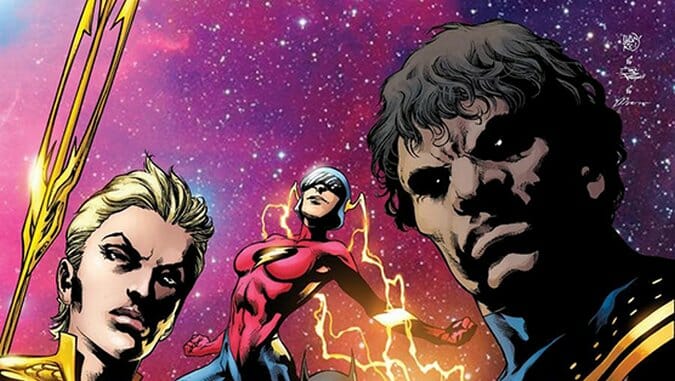The Multiversity #2 by Grant Morrison & Ivan Reis

Writer: Grant Morrison
Artist: Ivan Reis
Publisher: DC Comics
Release Date: April 29, 2015
Series Score: 9.2
Spoiler Alerts
The ninth and final issue of Multiversity—The Multiversity #2: Superjudge—doesn’t kick the fifth wall over a la Ultra Comics #1, or reimagine Superman as a walking (flying?) existential crisis like Mastermen #1, the previous two entries into the ambitious mini-series helmed by Grant Morrison.
It’s a load of fun though! A whole bunch of stuff blows up and the good guys win the big one.
Predictable? Maybe? But forgivable. Apart from the main story’s inevitable good-conquers-evil Happy Ending, the book flies as far off the rails as it can possibly manage in every other regard. Multiversity #2 doesn’t tie up many loose ends, either. For those who’ve been out of the loop, this series has consisted almost entirely of one-shot, standalone stories set in contrasting alternate realities populated by new versions of familiar characters: a medieval spin on Captain America from Earth-8 dubbed American Crusader, a version of Arrowette who is also Earth-16’s version of Miley Cyrus, a toddler Batman with no idea he’s actually a robot from Earth-42, ect. Their adventures are loosely tied together by the overarching threat of the entire Multiversity’s (every world ever created under publisher DC Comics) looming demise at the hands of mysterious, gigantics monstrosities known only as the Gentry.
So we’re not told the fate of Earth-10’s Nazi Superman analogue, Overman, from two issues back, for instance. But Morrison’s stated intention for the project was to put pieces in place for future stories; at no point were readers promised a sense of closure for the myriad tales started in this series.
Nor were we directly promised an extraordinarily bonkers finale that plays out much more cohesively than it probably should, given the presence of way, way too many superheroes…but we got it anyway.
In Multiversity #1, the first chapter of this saga, the Gentry murdered every one and thing that moved—especially the superheroes save lone survivor, Thunderer—then murdered them again for fun on Earth-7. But just because the Gentry can easily dispatch one set of Justice League/Avengers analogues doesn’t mean they can do the same with a few hundred of them scattered across string theory realities.
-

-

-

-

-

-

-

-

-

-

-

-

-

-

-

-

-

-

-

-

-

-

-

-

-

-

-

-

-

-

-

-

-

-

-

-

-

-

-

-













































